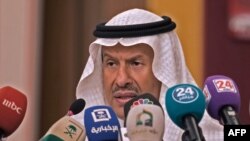OPEC+ ministers called off oil output talks on Monday after clashing last week when the United Arab Emirates balked at a proposed eight-month extension to output curbs, meaning no deal to boost production has been agreed.
Saudi energy minister Prince Abdulaziz bin Salman on Sunday called for "compromise and rationality" to secure a deal after two days of failed discussions last week. But on Monday, four OPEC+ sources said there had been no progress and talks were called off, without a new date being set.
The failure to agree on Monday means an expected increase in oil output from August will not take place, the sources said, helping to drive up international benchmark Brent crude, which was trading around 1% higher at close to $77 a barrel.
Some OPEC+ sources said there would be no oil output increase in August, while others said that a new meeting would take place in the coming days and they believed there will be a boost in August.
"There is no decision about August and discussions still continue. The market needs that oil," one source familiar with the talks said.
Oil prices are at the highest since 2018 and have already prompted concerns inflation could derail a global recovery from the pandemic.
OPEC+ agreed record output cuts of almost 10 million barrels per day (bpd) last year, about 10% of world output, as the pandemic hit. They have been gradually relaxed and stand at about 5.8 million bpd.
The UAE, sources said, on Friday accepted a proposal from Saudi Arabia and other OPEC+ members to raise output in stages by about 2 million bpd from August to December but rejected extending remaining cuts to the end of 2022 from a current end date of April.
The UAE is upset about the baseline from which its production cuts are being calculated and wants it raised. Abu Dhabi has invested billions of dollars to increase its production capacity and says its baseline was set too low when OPEC+ originally forged their pact.
On Monday, OPEC+ sources said the UAE's position was unchanged. They said a ministerial panel chaired by Saudi Arabia and Russia, the Joint Ministerial Monitoring Committee, needed more time to discuss the issue.
The UAE has said it was not alone in seeking a higher baseline as others, including Azerbaijan, Kazakhstan, Kuwait and Nigeria, had requested and received new ones since the deal was first agreed last year.
Decisions in OPEC+, which groups the Organization of the Petroleum Exporting Countries with Russia and other big producers, must be unanimous.
The dispute reflects a growing divergence between Saudi Arabia and the UAE.
The two nations had built a regional alliance, combining financial and military muscle to fight a conflict in Yemen and project power elsewhere. But the UAE has withdrawn from action in Yemen, while Saudi Arabia has sought to challenge the UAE's dominance as the region's business and tourism hub.
The UAE in August 2020 also agreed to normalize relations with Israel, while Saudi Arabia has no official diplomatic relations with Israel.





